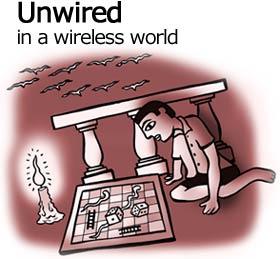Home > News > Specials
The Rediff Special/Tanmaya Kumar Nanda
August 21, 2003

As cliches go, this question - Where were you when the lights went out? - will likely rank a close second behind the earlier, more terrible one, that haunted us all two years ago.
Unfortunately, it says a lot about the gradual dumbing down we see all around, when a 3000-people-dead terror attack is in close competition with a mere blackout across eight states. I think it is ridiculous.
Or may be that is just my immigrant sensibility - after all, what is a blackout but a temporary inconvenience that will be over soon enough? Been that, done that, plenty of times, and then some. Difference - it was never such a big deal.
That would partly be because you live with the daily, sometimes hourly realization that, notwithstanding what the pols say, India is still a developing country, that your infrastructure isn't quite up to the mark and that such glitches are part and parcel of the process of getting there.
Some of my best memories of blackouts are of fun things - like sitting down to a game of carom or snakes & ladders with my parents and brother by lantern light; of going to bed to the song of the stars and sometimes the occasional late-lateef flock of white geese winging their V formations against the night sky; of sitting out on a terrace with friends with candles, mosquito repellant incense and red wine.
Here, my memories, only four days old, are of people panicking like it was the end of the world, wondering if it was terrorism, freaking out about air conditioners and microwaves not working, worrying about going offline, in a manner of speaking.
Which is why, when the lights conked out across Manhattan, and a large swath of the United States -- in retrospect, the 'superpower' tag sounds faintly ironic -- I flirted with the idea of terrorism and figured, so what? At worst, we won't have electricity. But I did stock on water, buying two five-liter bottles of Poland Spring. As it turned out, parts of Manhattan fell short of water, while Detroit was still boiling its supply.
That is the critical difference -- people don't expect this in a developed country, they just assumed it was all there, out there, and that someone was taking care of it. America is so wired it's just a part of being, you don't even see it, it's all underground, unlike India where if a wire shorts, curious neighbors will stand around and watch the sparks and even point out the erring pole to the electrician who comes to fix it.
The blackout in America proved how low tech hi tech really is -- it started with one, just one, power line snagged on a tree to take down eight states and parts of Canada. In Michigan, one suburb has resisted laying underground cables because they want to retain the old world feel of the place and it would entail digging trenches in their backyards -- a classic case of what David F Schulz, Executive Director, Infrastructure Technology Institute at Northwestern University, Evanston, called in a recent Newsday column 'NIMBY'ism: Not In My BackYard.
The other problem, of course, is that low tech alternatives have so long been forgotten by increasing dependency on electricity that most people were caught on the wrong foot when the lights went out. A friend in Canada and his landlord cooked over an open fire angithi (wood stove). My roommate had a simpler solution: 'Just pick up a magazine and start fanning.'
Even the so-called wireless gadgets all depend on how wired the backend is, really. First casualty cell phones; eventually, all manners of PDAs. At my home in Manhattan, we were lucky to have a corded phone at home, which my roommate connected as soon as the power outed. It was the only link I had with her, even though it meant I stood in a eight-strong line to make a call before walking 80 blocks to get home.
I would have taken a cab if I had gotten one, but the good old desi mentality of making a quick buck was alive and well Blackout Thursday. A friend told me how a cabbie was trying to gyp people with exorbitant prices for a 10-block ride. No meter, just a flat charge for each passenger.
Also, discrimination lives! An Asian-American woman flagged down by a Caucasian man on Queensboro Bridge agreed to give him a ride, but said no to his companion - an elderly, turbaned, bearded Sikh. Last seen, the Caucasian man had convinced her to take him in as well.
As they say, all is well that ends well.
Illustration: Uttam Ghosh
More Tales From the New York Blackout:
Down to the wire
The light of the heart
'I bet this happens in India'
A starry night at Hackensack